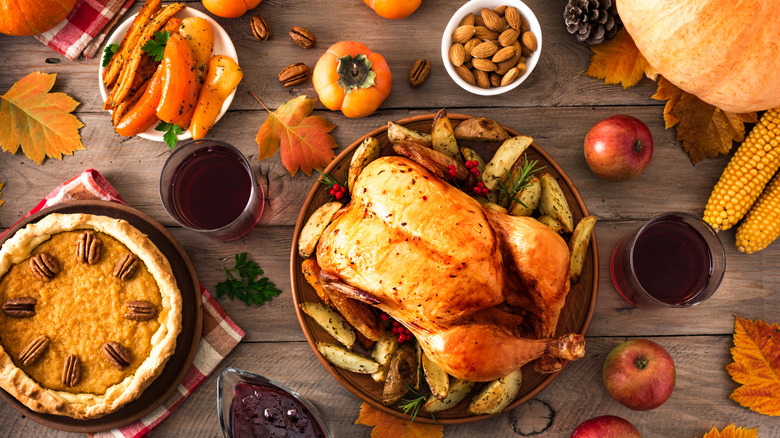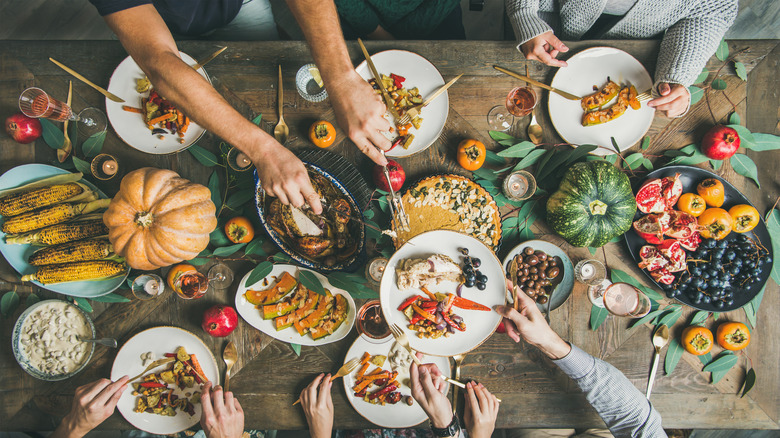How Friendsgiving Really Became A Thing
Friendsgiving — a wonderful celebration! Often harboring less of the intensive pressure of the actual turkey-eating holiday, Thanksgiving, Friendsgiving is a gathering with a heavy focus on friends (hence the name), food, and giving thanks. Friendsgiving is the kind of event that could involve simpler food options, like a roasted turkey breast instead of an entire bird, along with a hodgepodge of drinks, appetizers, side dishes, and desserts. Friendsgiving is sort of like a communal potluck of sorts, yet you may find the host has gone all out with Thanksgiving harvest decor and autumnal ambiance. It's hard to beat this kind of laid-back but Instagram post-worthy celebration.
While it's certainly a relatively newer event to grace the hustle and bustle of the holiday season, it's been celebrated often and with vigor (via CNN). You may even host your own annual Friendsgiving. But where did this fun spin on a traditional holiday stem from? Who invented it? Are there any other primary differences between Thanksgiving and Friendsgiving? We have the scoop.
A new tradition is born
Obviously, it should go without saying that Friendsgiving is a portmanteau of friends and giving (duh). Mirriam-Webster notes that the first printed examples of the word Friendsgiving date back to 2007, but in 2011, the word was used in a Bailey's Irish Cream ad campaign, and some think this sparked its popularity (via USA TODAY). After all, some folks do use the brand as an ingredient in some of the merriest holiday drinks.
The non-holiday holiday was also featured in an episode of Bravo's reality show "The Real Housewives of New Jersey." Within the past decade, the word's usage, and the events surrounding it, have boomed in popularity among friends, colleagues, and extended families.
CNN reports that Amy Adamczyk, a sociologist and professor, attributes the rise in this celebration to a cultural and familial shift. "As many people get married later in life or delay childbirth, some people may not have an immediate family of their own to celebrate the holiday with," She states, acknowledging that for those who don't have a family to celebrate with or those who live too far from their loved ones, Friendsgiving can present a new comfort and tradition.
How is Friendsgiving celebrated?
For those who generally attend Thanksgiving day outside of their home, or for those who miss it altogether due to work, Friendsgiving offers an alternate time to celebrate. It's a great time to test out a new recipe or show off your baking skills. Furthermore, while Thanksgiving often adheres to the traditional, Friendsgiving offers a looser, more nonchalant environment in which you can tweak classic recipes and potentially even reinvent the wheel altogether.
Friendsgiving can be celebrated on any day you'd like, so there are no constraints in terms of scheduling. Although The Atlantic reports this event generally takes place the week before or after Thanksgiving day, there are no real rules when it comes to Friendsgiving.
At its core, Friendsgiving is an opportunity to gather, give thanks, remember those who are no longer in attendance, enjoy good company, and eat fantastic food. The celebration allows for freedom, experimentation, and socializing, without having to adhere to any traditions or guidelines. So celebrate with your pals this year, and don't forget to give thanks.


